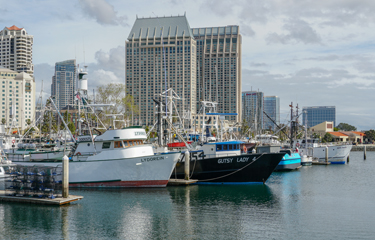Oceana, an international non-governmental organization dedicated to ocean conservation, has released a new analysis finding U.S. requirements for transparency in the operation of fishing vessels fall short compared to other countries, including the European Union.
The analysis found that only 12 percent of more than 19,000 commercial fishing vessels registered in the U.S. fleet are required to carry automatic identification systems (AIS). U.S. law only requires AIS devices onboard fishing vessels of 65 feet (20 meters) or longer and for those devices to transmit when the vessel is within 12 nautical miles from the coast. This is compared to the European Union requirements, where all vessels over 49 feet (15 meters) must continually broadcast AIS signals.
Though the European requirements are for boats that are only 16 feet (5 meters) in difference from U.S. vessels, decreasing the length of boat in the U.S. would increase AIS usage by 65 percent to cover more than 1,500 additional fishing vessels, Oceana said.
AIS is a tool to monitor fishing vessel activity at sea, though its original use was to increase maritime safety by reducing vessel collisions and enhancing awareness of vessel locations at sea. The AIS is inexpensive and easy-to-implement technology and a single device can broadcast a vessel’s location, speed, direction, and other identifying information that can demonstrate when a vessel is fishing and even infer what type of fishing the vessel is engaging in, according to Oceana.
“If we’re serious about stopping illegally caught seafood from entering the United States, we need to know more about the seafood we import, and to do that, we need to expand transparency of fishing. The United States must embrace transparency at home so we can demand it elsewhere,” said Beth Lowell, Oceana’s deputy vice president for the United States. “Expanding domestic rules will allow the United States to make vessel transparency a requirement for seafood imports and enhance our tools to combat illegal, unreported, and unregulated fishing.”
Many countries require continuous AIS transmission from fishing vessels, including the European Union, the United Kingdom, Liberia, and smaller fishing nations like Mauritius, which require smaller vessel to carry and transmit AIS devices. Indonesia requires all vessels in Indonesian waters, both domestic and foreign flagged, to use AIS devices.
Oceana has also called for expanded requirements for AIS use among international vessels that catch seafood eventually sent to the U.S. Doing so will raise the standard required for imported seafood, as transmitted tracking data from vessels can help the public and officials to monitor what is happening on the sea, Oceana said. This would result in more-effective enforcement of maritime and fishing laws by focusing enforcement and inspection on actions that are seen on higher-risk vessels, such as those that disable their tracking systems, or those apparently fishing in closed areas, it said. Up to 85 percent of the fish consumed in the U.S. is imported, and according to a report by the International Trade Commission, the U.S. imported an estimated USD 2.4 billion (EUR 2.2 billion) worth of seafood derived from illegal, unreported, and unregulated (IUU) fishing in 2019.
Oceana said catch documentation, seafood traceability, and transparency are critical to ensure that safe, legally caught, responsibly sourced, and honestly labeled seafood is making its way into the U.S. domestic market. Strengthening U.S. oversight over registered fishing vessels will help to identify suspicious behaviors, discourage illicit activity like illegal fishing and human rights abuses, and help to protect our ocean habitats and wildlife better, it said.
Photo courtesy of bonandbon/Shutterstock







